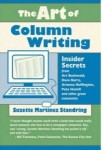Writers’ Academy
Article previously published in
Freelance Focus at PR Newswire, 3/21/2012
By Suzette Martinez Standring
 Maybe you write an informational or how-to column or blog based on a passionate interest. A popular column is an unbeatable platform for self-expression. Whether it’s about woodworking, social media, or pets, prepare your pitch to an editor. A query should include information about yourself, the type of column you write, and a list of ideas you’d like to pursue in your column. Writer, know thyself. It is an important piece of the pitch.
Maybe you write an informational or how-to column or blog based on a passionate interest. A popular column is an unbeatable platform for self-expression. Whether it’s about woodworking, social media, or pets, prepare your pitch to an editor. A query should include information about yourself, the type of column you write, and a list of ideas you’d like to pursue in your column. Writer, know thyself. It is an important piece of the pitch.
Editors want columnists who make their lives easier. Be accurate with facts and reliable on deadline. So be realistic about meeting deadlines. It may seem obvious, but too often, aspiring columnists, in their zeal for a byline, commit to a schedule they cannot keep, leaving readers disappointed, and editors sorely ticked.
Second, offer as part of your pitch how your column will increase readership. Niche and how-to columns are marketable, especially if they represent a popular interest, such as gardening, fitness, or computer technology. Offer a fresh approach on a common theme. For example, if your column is about parenting, then explain how readers may learn from your unique perspective. Maybe you’re the single dad of teenage daughters, or you are raising an adoptive family or a child with autism. Formats can range from simple Q&A to personal stories about challenges and solutions. Persuade the editor that your unusual angle will resonate with a diverse readership.
 If you lack a background or a degree in a particular field, here’s a happy myth-buster for aspiring how-to writers. You don’t have to be an expert. You only need to know who they are and how to interview such professionals. Your expertise is in the writing skill to convey such knowledge with accuracy. An ability to network with experts can be a selling point to editors.
If you lack a background or a degree in a particular field, here’s a happy myth-buster for aspiring how-to writers. You don’t have to be an expert. You only need to know who they are and how to interview such professionals. Your expertise is in the writing skill to convey such knowledge with accuracy. An ability to network with experts can be a selling point to editors.
Regarding clips for review, editors are interested in previously published work. They want to know other gatekeepers have taken a chance on you. Yet editors will take a chance on previously unpublished writers if they offer something not easily found elsewhere.
In addition to published clips, try submitting three or four ready-to-publish columns to set the hook. A good column length can be 500 to 800 words. These pieces will give an editor a sense of your ability to produce and a good overview of your writing. They see potential when the writing is outstanding, precise with details, and easy to understand. Convey one idea within each column.
In my book, The Art of Column Writing, I devote a chapter to Working With Editors, and here are some things that set an editor’s teeth on edge:
- The adversarial columnist who can’t take criticism,
- Problems with meeting deadlines – this includes late submissions, requests for time extensions, or never writing in advance of vacations or emergencies,
- The one-note column – be fresh in subject and approach,
- The too-generic columnist who lacks a clear voice or style,
- Columns that are written more in the style of journal or blog entries,
- Columnists who cannot write to the assigned length
At last, let’s talk about money. This Holy Grail feels elusive for two reasons: the dwindling budgets of newspapers and publications, and the access to excellent writers who will work for free. Every publication has its budget. You are a professional. Ask for a fee. The editor will let you know what is possible.
Way too frequently these days, a publication will offer promotion through its website or forum in lieu of payment. My old boss, a very famous attorney in his day, used to tell me, “Three bags of press clippings won’t buy you a loaf of bread.” You must decide if a publication’s circulation might be advantageous, or if its goal is worth the donation of your time and talent. Don’t feel like the bad guy because you say no.
Freebies should be the exception, not the rule. You work, sweat, and bleed for your craft. Seek out publications that pay. Maybe you can write a how-to column about it. I promise it would be widely read!
Email Suzette Standring: suzmar@comcast.net
Suzette Martinez Standring is a nationally syndicated columnist with GateHouse News Service. She is the award-winning author of The Art of Column Writing: Insider Secrets from Art Buchwald, Dave Barry, Arianna Huffington, Pete Hamill and Other Great Columnists. Her book is used in university journalism courses and forms the basis of her national writing workshops. She is the TV host and producer of It’s All Write with Suzette,” a program about the craft of writing on Milton (MA) Cable Access TV. Episodes can be watched on www.vimeo.com/SuzetteStandring She is a past president of The National Society of Newspaper Columnists.
She created a guided imagery CD specific to creative writing. “Suzette Standring: A Writer’s Meditation CD” is available only on her website, www.readsuzette.com Visit her Book and CD page for more information.

